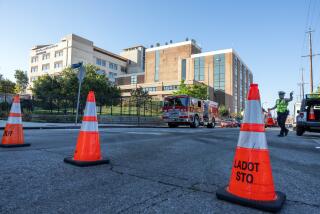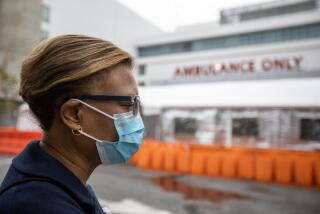King/Drew Given Tentative Approval
- Share via
A national hospital commission has tentatively told Martin Luther King Jr./ Drew Medical Center that it passed a recent inspection and would maintain full accreditation, Los Angeles County officials said Monday.
But the long-troubled county hospital must first fix 14 problems identified during a regularly scheduled review last week.
The inspection by the Joint Commission on Accreditation of Healthcare Organizations, conducted every three years, is considered a national barometer of hospital quality.
County officials said the findings were particularly significant as King/Drew works to recover from a devastating series of lapses in patient care and regulatory sanctions in recent months.
A buoyant Supervisor Yvonne Brathwaite Burke said at a news conference at King/Drew on Monday that the survey results were very symbolic.
“It’s certainly good to have a good news day rather than a bad news day, because we’ve had our share of those,” said Burke, whose district includes the hospital, in Willowbrook just south of Watts. “It’s time to move on.”
Dr. Thomas Garthwaite, director of the county Department of Health Services, called the commission’s findings “an important milestone in what we believe is a profound transformation of the medical center.”
Hospitals pay the joint commission to conduct its surveys. The commission has the power to strip a hospital of accreditation but rarely does so.
The group notifies hospitals of its inspection dates in advance, allowing them to prepare for reviewers. King/Drew, like many hospitals, hired consultants to help with preparations.
Marc Forstneger, a spokesman for the commission, said that a final decision on King/Drew had not been made and that preliminary findings by reviewers could be changed before they were finalized.
The last time the commission reviewed King/Drew comprehensively, in 2001, the hospital also passed the inspection. But the commission gave it a score of 82 out of 100, which placed it in the bottom 3% of hospitals nationally.
King/Drew corrected its problems at that time to reviewers’ satisfaction. Beginning this year, the commission no longer rates hospitals with a score; instead, it indicates which areas need improvement.
To keep its accreditation now, King/Drew must correct such problems as failing to note patients’ conditions on their charts, failing to take patients’ histories and physical exams fast enough, and failing to adequately staff the emergency room.
The commission’s reports were not released publicly, but a summary of the findings was contained in a memo from Garthwaite to the Board of Supervisors.
Those are not the only problems King/Drew must fix. Separately from the commission, which is a private agency, government health inspectors have criticized the hospital for systemic nursing and pharmacy failures that harmed or even killed patients.
At one point in March, the federal government threatened to cut off funding to the 32-year-old hospital, but retreated after King/Drew officials scrambled to fix serious failings in its administration of prescription drugs to patients.
The U.S. Centers for Medicare and Medicaid Services plans to return to the hospital in coming weeks to conduct a broad inspection.
Yet another group, the Accreditation Council for Graduate Medical Education, has lifted King/Drew’s ability to train surgeons, radiologists and neonatologists. The council has also indicated that the hospital’s supervision of residency programs was substandard.
“We have a lot further to go, and I have every confidence in the world that we’re going to go there,” said Fred Leaf, chief operating officer of the Department of Health Services.
Burke drew the most sustained applause from doctors and nurses who attended the news conference when she said King/Drew was being held to a higher standard by outside reviewers than other hospitals as a result of unfavorable media coverage.
“If you talk to people everywhere throughout Los Angeles, they say: ‘Boy, they have really been victimized in the press,’ ” she said. “And when you’ve had a constant hammering by the press ... obviously then you’re going to have a higher level you’ll have to reach in order to meet the accreditation.”
More to Read
Sign up for Essential California
The most important California stories and recommendations in your inbox every morning.
You may occasionally receive promotional content from the Los Angeles Times.










